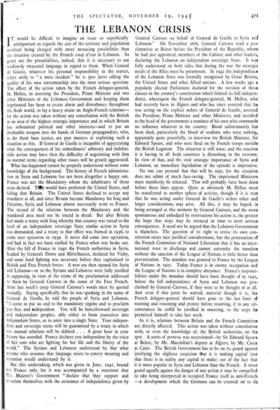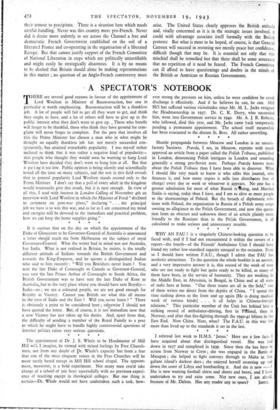THE LEBANON CRISIS
I T would be difficult to imagine an issue so superficially unimportant as regards the size of the territory and population involved being charged with more menacing possibilities than the situation created by the French coup d'etat in Lebanon. So grave are the potentialities, indeed, that it is necessary to use studiously measured language in regard to them. When General de Gaulle, whatever his personal responsibility in the matter, refers airily to "a mere incident" he is ipso facto calling the quality of his own statesmanship into the most serious question. The effect of the action taken by the French delegate-general, M. Helleu, in arresting the President, Prime Minister and two other Ministers of the Lebanese Government and keeping them imprisoned has been to create alarm and disturbance throughout the Arab world, to lay a heavy strain on Anglo-French relations— for the action vvas. taken without any consultation with the British in an area of the highest strategic importance and in which Britain has substantial political and other interests—and to put an invaluable weapon into the hands of German propagandists, who, to do them bare justice, are past masters at exploiting such a situation as this. If General de Gaulle is incapable of appreciating what the consequences of his subordinates' arbitrary and indefen- sible action may have then the difficulty of negotiating with him on normal terms regarding other issues will be greatly aggravated.
What has happened cannot be properly understood without some knowledge of the background. The history of French administra- tion in Syria and Lebanon has not been altogether a happy one. France was not the -Mandatory whom the inhabitants or those areas desired. THDy would have preferred the United States, and failing that Britain. The United States declined to accept any mandates at all, and since Britain became Mandatory for Iraq and Palestine, Syria and Lebanon almost necessarily went to France. The record of the relations between the Mandatory and the mandated area need not be traced in detail. But after Britain, had made a treaty with Iraq whereby that country was raised to the level of an independent sovereign State similar action in Syria was demanded, and a treaty to that effect was framed in 1936, to come into operation in 1939. It never did come into operation, and had in fact not been ratified by France when war broke out. After the fall of France in 1940 the French authorities in Syria, headed by Generals Dentz and Mittelhauser, declared for Vichy, and some hard fighting was necessary before they capitulated to British and Free French forces. A new era then opened for Syria and Lebanon—or so the Syrians and Lebanese were fully justified in supposing, in view of the terms of the proclamation addressed to them by General Catroux in the name of the Free French. After last week's coup General C.atroux's words must be quoted textually. Saying specifically that he was speaking in the name of General de Gaulle, he told the _people of Syria and Lebanon, "I come to put an end to the mandatory regime and to proclaim you free and independent. You will be henceforward sovereign and independent peoples, able either to form yourselves into independent States, or to unite into a single State. Your indepen- dent and sovereign status will be guaranteed by a treaty in which our mutual relations will be defined. . . . A great hour in your history has sounded. France declares you independent by the voice of her sons who are fighting for her life and the liberty of the world." The Syrians and Lebanese understood by that what anyone who assumes that language exists to convey meaning and intention would understand by it.
But this undertaking, which was given in June, 1941, bound not France only, for it was accompanied by a statement that His Majesty's Government "declare that they support and associate themselves with the assurance of independence given by General Catroux on behalf of General de Gaulle to Syria and Lebanon." On November 26th, General Catroux read a pro- clamation at Beirut before the President of the Republic, whom he had just appointed, members of the Cabinet and other leaders, declaring the Lebanon an independent sovereign State. It was fully understood on both sides that during the war the strategic needs of the Allies must be paramount. In 1942 the independence of the Lebanon State was formally recognised by Great Britain, the United States and other Allied nations. A few weeks ago a popularly elected Parliament declared for the revision of those clauses in the country's constitution which limited its full indepen- dence, whereupon the French delegate-general, M. Helleu, who had recently been in Algiers and who has since asserted that he was acting on the explicit orders of General de Gaulle, arrested the President, Prime Minister and other Ministers, and installed as the head of the government a nominee of his own who commands no influence whatever in the country. Blood unfortunately has been shed, particularly the blood of students who were seeking, apparently quite peacefully, to interview the British Minister, Sir Edward Spears, and who were fired on by French troops outside the British Legation. The situation is still tense, and the reaction it is having in all Arab countries is disturbing in the extreme. In view of that, and the vital strategic importance of Syria and -Lebanon, an immediate liquidation of the episode is imperative.
No one can pretend that that will be easy, for the situation does not admit of much face-saving. The imprisoned Ministers must manifestly be released. That will probably have been done before these lines appear. Quite as obviously M. Helleu must be transferred to another sphere of activity, though if it is true that he was acting under General de Gaulle's orders other and larger considerations may arise. All this, it may be hoped, is being arranged at this moment by General Catroux, and the more spontaneous and unhedged by reservations his action is, the greater the hope that steps may be retraced in time to avert serious consequences. It need not be argued that the Lebanon Government is blameless. The question of its right to revise its own con- stitution raises nice juridical considerations, but the protestation of the French Committee of National Liberation that it has an inter- national trust to discharge and cannot surrender the mandate without the sanction of the League of Nations is little better than prevarication. The mandate was granted to France by the League of Nations in 1921. Today.France is in enemy occupation and the League of Nations is in complete abeyance. France's responsi- bilities under the mandate should have been thought of in 1941, before the full independence of Syria and Lebanon was pro- claimed by General Catroux, if they were to be thought of at all. And even if that point be waived, material though it is, the French delegate-general should have gone to the last limit of warning and reasoning and protest before resorting, if in any cir- cumstances he could be justified in resorting, to the steps he permitted himself to take last week.
• As it is, relations between Britain and the French Committee are directly affected. This action was taken without consultation with, or even the knowledge of, the British authorities on the spot. A series of protests was necessitated—by Sir Edward Spears at Beirut, by Mr. Macmillan's deputy at Algiers, by Mr. Casey at Cairo. The British Goverrunent has to be on its guard against justifying the slightest suspicion *at it is making capital (not that there is in reality any capital to make) out of the fact that it is more popular in Syria and Lebanon than the French. It must guard ually against the danger of any action it may be compelled to take being interpreted in occupied France itself as anti-French —a development which the Germans can be counted on to do their utmost to precipitate. /there is a situation here which needs careful handling. Never was this country more pro-French. Never did it desire more ardently to see across the Channel a free and democratic French Government established on the soil of a liberated France and co-operating in the organisation of a liberated Europe. But that cannot justify support of the French Committee of National Liberation in steps which are politically unjustifiable and might easily be strategically disastrous. It is by no means to be desired that Britain should alone be making representations in this matter ; no question of an Anglo-French controversy must arise. The United States clearly approves the British attitude and, vitally concerned as it is in the strategic issues involved, it could with advantage associate itself formally with the British protests: -But what is most to be hoped, of course, is that General Catroux will succeed in restoring not merely peace but confidence, difficult though that may be. It is essential not only that this mischief shall be remedied but that there shall be some assurance that no repetition of it need be feared. The French Committee can ill afford to leave questionings and doubts in the minds of the British or American or Russian Governments.



























 Previous page
Previous page